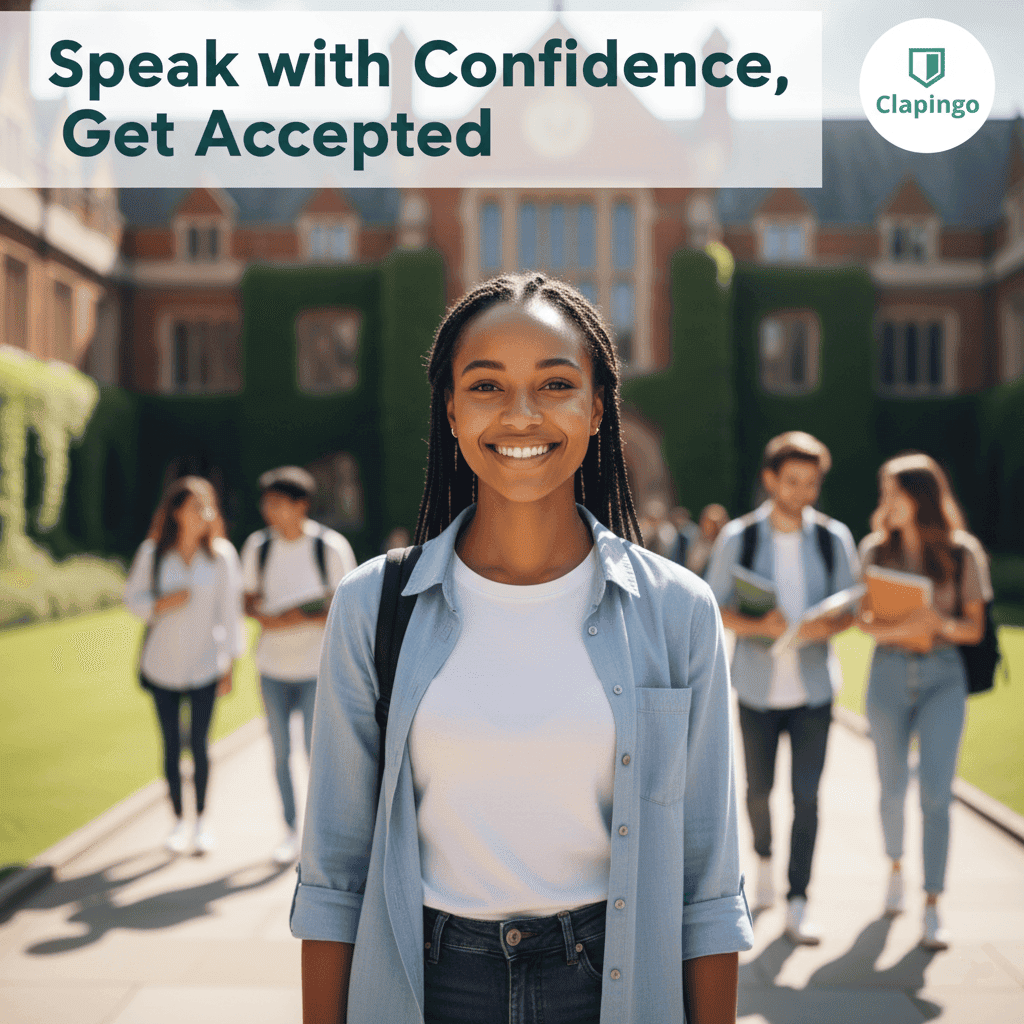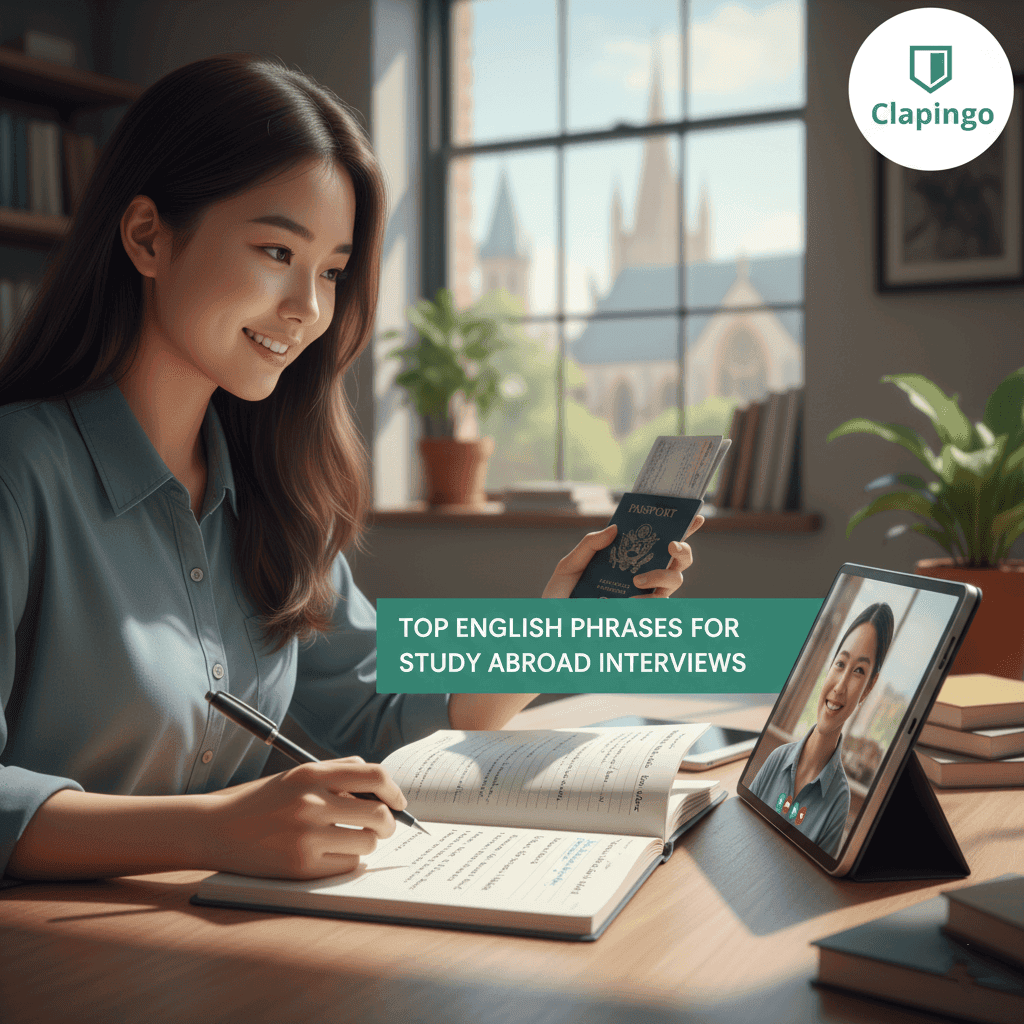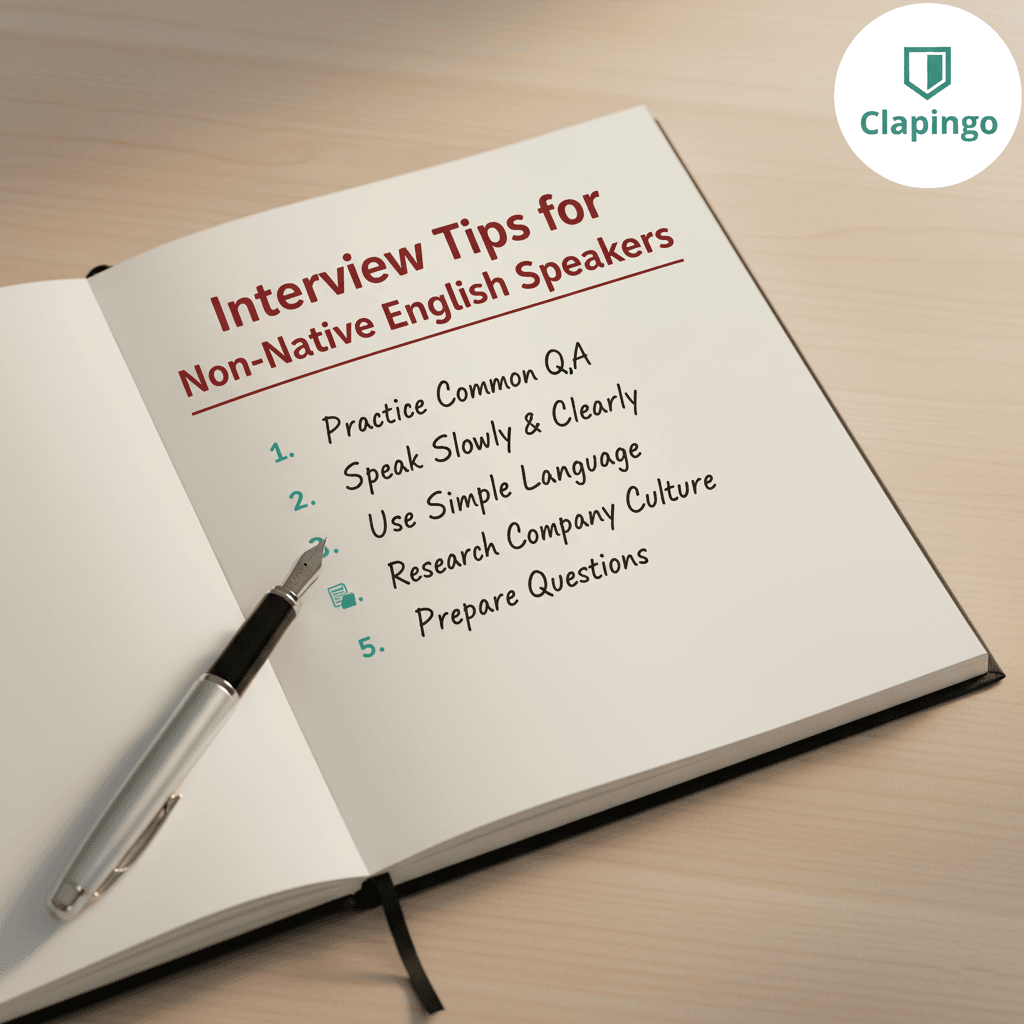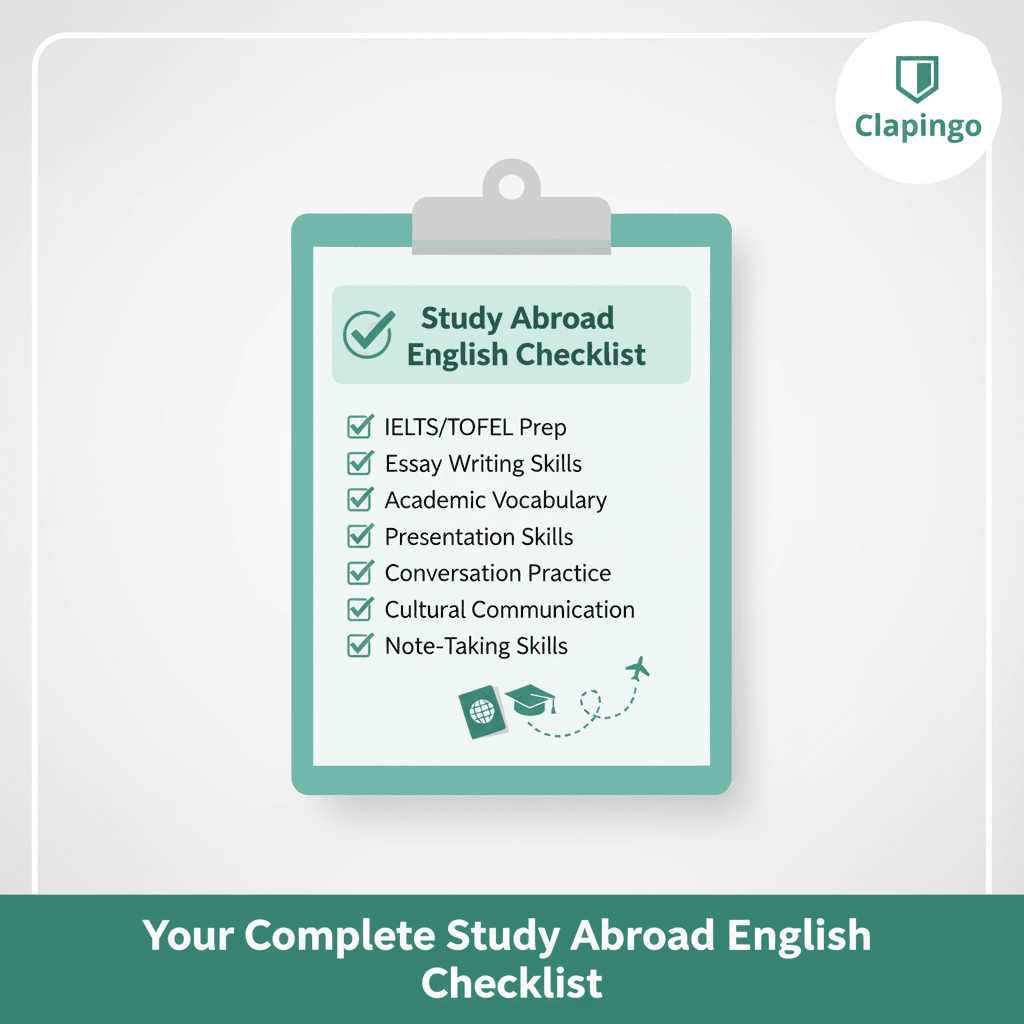Ace Your Study Abroad Interview: A Comprehensive English Guide
Master your study abroad interview with our detailed English guide. Learn student visa tips, university interview strategies, F1 visa preparation, and get expert guidance from Clapingo.

Best Tips To Study Abroad
Studying abroad is an exciting chapter in any student’s life. But before you can experience new cultures, learn from world-class institutions, and expand your career prospects, there is one key hurdle: the study abroad interview. This includes student visa interviews, university interviews, and for U.S. students, the F1 visa interview.
These interviews assess your English proficiency, clarity of purpose, and readiness to study abroad. Doing well requires strategic preparation, understanding of interview expectations, and regular practice. This guide will provide a detailed roadmap for preparing effectively, improving your study abroad interview English, and confidently clearing all interview rounds.
Why Study Abroad Interviews Matter
Interviews are more than formalities. They play a crucial role in deciding:
Whether you’re a good fit for your chosen university program.
Whether your financial and personal plans align with visa regulations.
Whether you can communicate effectively in English, which is critical for your academic success abroad.
A poorly prepared candidate may be rejected, even with strong academic records. Conversely, a well-prepared student can impress interviewers, demonstrating confidence, clarity, and commitment.
Types of Interviews You Might Face
1. University Interview
University interviews usually focus on:
Your academic background and achievements.
Your career goals and motivation for studying abroad.
Your personal interests and extra-curricular achievements.
Typical questions include:
Why do you want to join this program?
How does this degree fit into your career plan?
What challenges do you foresee, and how will you tackle them?
2. Student Visa Interview
The student visa interview is mainly about intent and authenticity:
Confirming acceptance at a recognized institution.
Checking financial capacity.
Verifying ties to your home country, ensuring you’ll return after studies.
Key questions can be:
Why do you want to study abroad?
Who is funding your education?
What are your plans after completing your course?
3. F1 Visa Interview (U.S.)
The F1 visa interview has specific requirements:
Valid I-20 form issued by the U.S. university.
Proof of sufficient funds to support studies.
Clear intent to return to your home country after completing your education.
Interviewers focus heavily on confidence, clarity, and English fluency.
Preparing Your English for Study Abroad Interviews
Your English communication skills can make or break an interview. Here’s a step-by-step approach:
1. Build Confidence in Speaking
Practice daily conversations in English.
Focus on clear pronunciation, vocabulary, and sentence structure.
Record yourself and review your answers for improvement.
2. Use Mock Interviews
Simulate real interview scenarios:
Ask friends or mentors to conduct mock interviews.
Practice answering common and tricky questions.
Time your answers to ensure conciseness.
3. Focus on Grammar and Fluency
Brush up on basic grammar rules to avoid mistakes.
Learn common phrases used in interviews, such as “I am passionate about…”, “My long-term goal is…”, and “I have chosen this program because…”.
4. Leverage Clapingofor Practice
Clapingo provides:
Live English speaking practice with experts and native speakers.
Feedback on tone, vocabulary, and fluency.
Flexible scheduling to fit your prep plan.
Student Visa Interview: Everything You Need to Know
A student visa interview evaluates your eligibility and intent. To excel:
1. Organize Your Documents
Ensure all documents are ready:
Passport
Acceptance letter from the university
Financial statements
Academic transcripts
I-20 (for U.S. students)
2. Answer Questions Confidently
Be concise but clear.
Maintain honesty; do not exaggerate.
Practice answers using simple English, emphasizing clarity.
3. Common Questions
Why did you choose this country?
Who is sponsoring your studies?
What will you do after completing your studies?
University Interview: How to Stand Out
Universities evaluate academic and personal readiness. Here’s how to excel:
1. Research Thoroughly
Know your program’s curriculum.
Understand the university’s mission and values.
Be aware of faculty achievements.
2. Showcase Your Strengths
Highlight relevant achievements.
Mention projects, internships, or volunteering.
Explain how your skills align with the program.
3. Engage with Insightful Questions
Asking thoughtful questions demonstrates:
Genuine interest in the program.
Ability to think critically.
Preparedness and initiative.
F1 Visa Interview: The U.S. Perspective
The F1 visa interview is unique:
1. Dress Professionally
Business casual or formal is preferred.
Make a positive first impression.
2. Be Direct and Honest
Answer only what is asked.
Avoid over-explaining unless necessary.
3. Manage Anxiety
Practice deep breathing and positive visualization.
Stay calm and maintain eye contact.

Body Language To Study Abroad
The Role of Education Counseling in Your Preparation
Education counselors play a critical role:
Program Guidance: Suggest suitable courses and universities.
Application Assistance: Help with documentation and deadlines.
Interview Coaching: Provide mock sessions, tips, and feedback.
Clapingo Collaboration: Many students use Clapingo along with education counseling to combine content knowledge and English fluency, ensuring a holistic preparation strategy.
Common Questions and How to Answer Them
Question | Purpose | How to Answer |
|---|---|---|
Why do you want to study abroad? | Assess motivation | Focus on career goals, academic growth, and global exposure |
How will you fund your studies? | Check financial preparation | Provide clear, documented evidence of financial support |
Why did you choose this university? | Evaluate research and fit | Mention program strengths, faculty, opportunities, and alignment with goals |
What will you do after graduation? | Assess future intent | Show realistic career or academic plans emphasizing return to home country if visa-related |
Clapingo’s Unique Approach to Interview Readiness
Clapingo helps students prepare for all types of study abroad interviews:
Interactive Live Sessions: Practice speaking with experts.
Personalized Feedback: Receive guidance tailored to your English fluency level.
Flexible Learning: Train at your convenience and pace.
Focus on Real Scenarios: Simulate visa interviews, university discussions, and mock sessions.
Tips and Tricks for a Successful Interview
Preparation is Key: Research the program, university, and visa requirements thoroughly.
Practice Daily: Use English for conversations and mock interviews.
Stay Positive: Confidence is visible in your tone, posture, and clarity.
Keep Answers Concise: Stick to relevant points and avoid unnecessary details.
Listen Carefully: Understand each question before responding.
Dress Smartly: Your appearance affects first impressions.
Did You Know?
The first 30 seconds of your interview make the strongest impression.
Universities often note soft skills, not just academics.
A friendly, confident tone in English often outweighs flawless grammar.
F1 visa officers assess whether students are genuinely motivated to study or just seeking a work visa.
Sample Mock Interview Schedule
Day | Activity | Duration | Focus Area |
|---|---|---|---|
Day 1 | Self-Introduction Practice | 30 min | Clarity, confidence, pronunciation |
Day 2 | Common University Questions | 45 min | Motivation, goals, research |
Day 3 | Student Visa Mock | 30 min | Documentation, financial proof |
Day 4 | F1 Visa Scenario | 45 min | English fluency, concise answers |
Day 5 | Feedback Session with Clapingo Expert | 60 min | Corrections, tips, improvement |
Day 6 | Full Mock Interview | 60 min | Complete preparation simulation |
Handling Stress and Anxiety Before the Interview
Interviews can be stressful. Managing stress is crucial to maintaining English fluency and confidence. Tips include:
Practice mindfulness and deep breathing exercises.
Engage in positive self-talk, e.g., “I am prepared and capable.”
Visualize the interview scenario to reduce anxiety.
Take short breaks during preparation to avoid burnout.
Understanding Cultural Differences in Interviews
Different countries have varying expectations:
U.S. Interviews: Focus on individual achievements and clarity.
UK/Canada Interviews: Emphasize collaborative skills and academic focus.
Australia: Friendly and conversational tone is valued.
Knowing cultural nuances can help tailor your study abroad interview English and make a better impression.

English Tips To Study Abroad
Crafting a Perfect Self-Introduction
Your introduction sets the tone. Structure it clearly:
Greeting: “Good morning, my name is….”
Academic Background: Mention major achievements briefly.
Motivation: Why you chose the course and university.
Future Goals: Show alignment with the program.
Keep it concise: 30–45 seconds is ideal. Practice with Clapingo experts for fluency.
Using STAR Method for Behavioral Questions
Behavioral questions are common in university interviews. Use STAR (Situation, Task, Action, Result):
Situation: Briefly describe context.
Task: Explain what was required.
Action: Detail steps taken.
Result: Highlight outcomes and learning.
This method ensures structured and clear answers, enhancing your English expression.
Improving Vocabulary for Interviews
A strong vocabulary makes your English sound polished. Strategies:
Learn key academic and professional phrases: e.g., “I am passionate about…”, “This program aligns with my career goal…”.
Read articles or watch lectures in your field.
Maintain a vocabulary diary with 5–10 new words daily.
Practicing Non-Verbal Communication
Body language impacts perception:
Maintain eye contact to show confidence.
Avoid fidgeting and slouching.
Smile naturally to appear approachable.
Use gestures sparingly to emphasize points.
Non-verbal cues can support your verbal English skills and leave a strong impression.
Handling Difficult or Unexpected Questions
Some interviewers ask unexpected questions to test thinking:
Remain calm; take a moment to think.
Use bridging phrases: “That’s an interesting question. My perspective is…”
Relate answers back to your goals, experiences, or preparation.
Avoid panic or fabricated answers.
Practice in Clapingo mock sessions with random questions to train for these scenarios.
Leveraging Technology for Preparation
Digital tools can enhance your preparation:
Clapingo: Live practice with experts.
Recording Apps: Review your answers and body language.
Language Learning Apps: Strengthen grammar and vocabulary.
Online Forums: Join student communities for tips and shared experiences.
Creating a Personalized Interview Preparation Plan
Organize preparation into a structured plan:
Assess your current English proficiency.
Identify areas for improvement (vocabulary, fluency, confidence).
Schedule daily speaking practice, mock interviews, and feedback sessions.
Track progress and adjust strategy as needed.
A clear plan reduces stress and ensures thorough preparation.
Post-Interview Follow-Up Etiquette
After the interview:
Send a thank-you email to the university or counselor if appropriate.
Reflect on what went well and areas for improvement.
Use feedback for future interviews or visa appointments.
Stay confident and patient as results are processed.

Best Tips For Non-Native Speakers
Understanding Interviewer Expectations
Knowing what interviewers want helps you tailor your answers:
Universities focus on academic readiness, motivation, and fit.
Visa officers focus on genuine intent, financial stability, and ties to home country.
F1 visa interviews also test clarity of future goals and return intentions.
Understanding expectations allows you to preemptively address concerns in your responses.
Common Mistakes Students Make
Avoid these pitfalls:
Memorizing answers instead of thinking naturally.
Speaking too fast or too slowly.
Not maintaining eye contact or appearing distracted.
Overloading answers with unnecessary details.
Ignoring cultural etiquette of the country.
Practicing with Role-Playing Exercises
Role-playing is a highly effective method:
Ask a friend or mentor to act as an interviewer.
Switch roles to gain perspective on what the interviewer looks for.
Use scenarios like visa interviews, university interviews, and unexpected questions.
Record and review to fine-tune English, tone, and body language.
Preparing Your Academic and Personal Story
Every candidate should have a cohesive narrative:
Academic journey: Highlight achievements and challenges.
Personal growth: Discuss experiences that shaped your goals.
Future plans: Connect education abroad to career aspirations.
A strong story demonstrates clarity, authenticity, and motivation.
Using Technology to Practice English Intelligently
Beyond Clapingo, technology can enhance learning:
AI-powered speaking tools for pronunciation feedback.
Vocabulary apps tailored for academic or professional English.
Online mock interview simulators with instant evaluation.
Understanding the Importance of Punctuality
Arriving on time shows professionalism and seriousness:
For online interviews, check internet connectivity and platform compatibility in advance.
For in-person interviews, arrive 15–20 minutes early.
Use waiting time to review notes or calm nerves.
Dressing for Success in Online and Offline Interviews
Appearance impacts first impressions:
Opt for professional attire, even in video interviews.
Avoid distracting backgrounds or clutter in online sessions.
Maintain good posture, smiles, and gestures to reinforce confidence.
Handling Language Barriers
Even proficient students may face occasional language difficulties:
Don’t panic if you forget a word—pause and rephrase.
Use simple, clear English rather than complicated vocabulary.
Ask politely if you did not understand a question: “Could you please repeat or clarify?”
Time Management During Your Interview
Effective communication involves time awareness:
Avoid rambling; stick to 2–3 concise points per question.
Prioritize key achievements or motivations first.
Balance between confidence and brevity to leave a strong impression.
Networking and Building Connections Post-Interview
Interviews are not just about evaluation—they’re an opportunity to connect:
Engage with alumni or counselors to gain insights into universities and visas.
Follow up politely via LinkedIn or email.
Join student forums to learn from peers’ experiences.

Checklist To Study Abroad
Conclusion
Preparing for a study abroad interview requires a blend of English proficiency, clarity of purpose, and thorough preparation. From student visa interviews to university and F1 visa interviews, each has unique expectations. By practicing study abroad interview English, leveraging mock interviews, using platforms like Clapingo, and following structured preparation schedules, you can increase your chances of success.
Remember, interviews are not just about what you know, they are about how confidently and clearly you present it. With practice, persistence, and the right guidance, you can turn your study abroad dream into reality.
Next Steps: Schedule a Clapingo trial session to start practicing live English interviews today. Build confidence, sharpen communication skills, and be fully prepared for your student visa and university interviews.
Read Also: Top English Speaking Countries to Settle Down
Comments
Your comment has been submitted